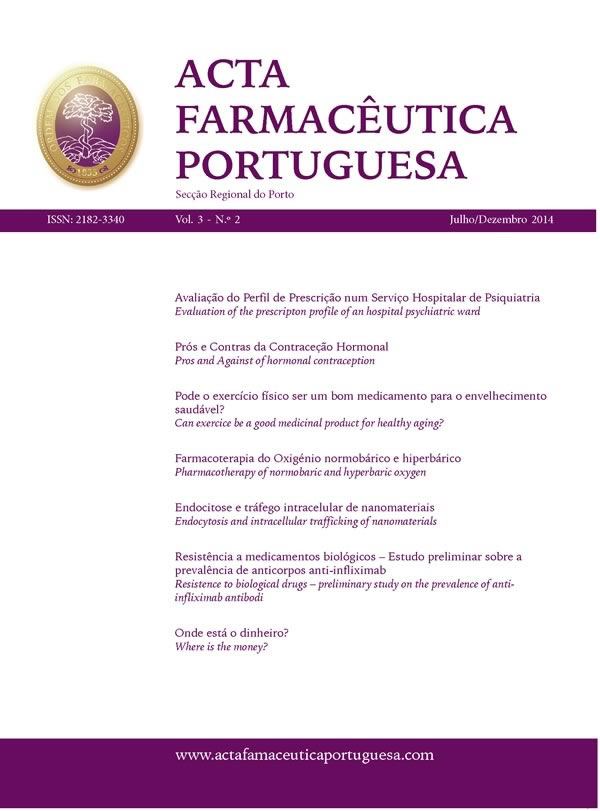Evaluation of the prescripton profile of an hospital psychiatric ward
Abstract
Introduction: As the population ages there is an increase need for certain groups of medication to maintain the individual’s quality of life. On one hand the use of several types of drugs is an important factor in maintaining the patients’ well-being, however on the other hand, these types of drug combinations can lead to various complications especially on psychiatric patients. In view of these problems, the pharmacist has been shown to be the most appropriate health career to minimize medication-related problems.
Methods: For 24 hours, the medical prescriptions of the patients admitted in this study were analyzed. A total of 235 patients were chosen.
Results and Discussion: In general, most of the services analyzed were in a situation of “excessive polypharmacy”, which can be attributed to the doctors need to prescribe multiple antipsychotics to treat psychiatric disorders. However, the effect of these combinations is yet to be more intensively studied.
Conclusion: After careful analysis of the results, the main conclusion is that pharmacists, due to their intensive drug knowledge, play a crucial role in the monitorization of the patient’s therapy.
References
Muir AJ et al. Reducing medication regimen complexity. J. Gen. Int. Med., 2001; 16(2): 77–82.
Melo DO, Ribeiro E, Storpirtis, S. A importância e a história dos estudos de utilização de medicamentos. Revista Brasileira de Ciências Farmacêutica,
;42(4):1-11.
Silverman, JB et al. Multifaceted approach to reducing preventable adverse drug events. Am. J. Health-System Pharmacy (AJHP) 2003; 60(6): 582-6.
Scott, I et al. Minimizing inappropriate medications in older populations: a 10-step conceptual framework. Am. J. Med. 2012;125(6):529-37.
Hovstadius B, Petersson G. The impact of increasing polypharmacy on prescribed drug expenditure - a register-based study in Sweden 2005-2009. Health Policy 2013;109(2):166-74.
Chumney EC, Robinson LC. The effects of pharmacist interventions on patients with polypharmacy. Pharmacy Practice 2006;4(3):103-9.
Martin P. et al. An educational intervention to reduce the use of potentially inappropriate medications among older adults (EMPOWER study): protocol for a cluster randomized trial. Trials 2013;14(1):2-11.
Beijer H.J.M., Blaey C.J. Hospitalisations caused by adverse drug reactions (ADR): a meta-analysis of observational studies. PWS. 2002; 24(2): 46–54.
Hoefler, R. Interações medicamentosas. Secretaria de Ciência, Tecnologia e Insumos Estratégicos/MS – FTN 2005;1:1-4.
Chan M, Nicklason F, Vial J.H. Adverse drug events as a cause of hospital admission in the elderly. Int. Med. J. 2001; 31(4):199–205.
Tani H., Interventions to reduce antipsychotic polypharmacy: a systematic review. Schizophrenia Res. 2013; 143(1): 215–20.
Ministério da Saúde. Portaria n.o 137-A/2012: Regulação da prescrição por denominação comum internacional (DCI). 2012.
Rodríguez-Terol A, Calidad estructural de las bases de datos de interacciones. Farmacia Hospitalaria 2009;33(3):134-46.
Correll C.U. Antipsychotic polypharmacy: a survey study of prescriber attitudes, knowledge and behavior. Schizophrenia Res. 2011; 131(1-3): 58–62.
Huffman J.C.. Antipsychotic polytherapy on an inpatient psychiatric unit: how does clinical practice coincide with Joint Commission guidelines? General Hospital Psychiatry 2011; 33(5): 501–8.
Morrato E.H.. Prevalence, utilization patterns, and predictors of antipsychotic polypharmacy: experience in a multistate Medicaid population, 1998-2003. Clinical Therapeutics. 2007; 29(1): 183–95.
Tsutsumi C.. The evolution of antipsychotic switch and polypharmacy in natural practice-a longitudinal perspective. Schizophrenia Res. 2011;130(1-3):40–6.
Arilla J.A., et al. Antipsychotic polypharmacy in a general hospital inpatient psychiatric unit. Revista de Psiquiatría y Salud Mental (English Edition) 2010;3(3):90-96.
Hajjar E.R., Cafiero A.C., Hanlon J.T. Polypharmacy in elderly patients. Am. J. Geriatric Pharmacother. 2007;5(4):345–51.
Fouquet A.. Detection of potentially inappropriate medication in a French geriatric teaching hospital: A comparison study of the French Beers criteria and the improved prescribing in the elderly tool. Eur. Geriatric Med., 2012; 3(5): 326–29.
Hanlon J.T.. Adverse drug events in high risk older outpatients. J. Am. Geriatrics Soc. 1997; 45:945–48.
Alomar M.J. Factors affecting the development of adverse drug reactions (Review artice). Saudi Pharmaceutical J. 2013;1:1–12.
Budnitz D.S., Medication use leading to emergency department visits for adverse drug events in older adults. Ann. Int. Med. 2007; 147: 755–65.
Klotz U. Pharmacokinetics and drug metabolism in the elderly. Drug Metabol. Rev. 2009; 41(2): 67–76.
Hajjar E.R. Adverse drug reaction risk factors in older outpatients. Am. J. Geriatric Pharmacotherapy 2003; 1: 82–89.
Debellis K, et al. Incidence and preventability of adverse drug events among older persons in the ambulatory setting. JAMA 2003;289 (9):1107–16.
Harugeri A.. Prescribing patterns and predictors of high-level polypharmacy in the elderly population: A prospective surveillance study from two teaching hospitals in India. Am. J. Geriatric Pharmacotherapy 2010;8(3): 271–80.
Rothschild J.M., Medication errors recovered by emergency department pharmacists. Ann. Emergency Med. 2010;55(6):513–21.
Mergenhagen K.A. Pharmacist-versus physician-initiated admission medication reconciliation: impact on adverse drug events. Am. J. Geriatric Parmacotherapy 2012;10(4):242–50.
Saddique A.A. Development of Clinical Pharmacy services at King Khalid University Hospital and its impact on the quality of healthcare provided. Saudi pharmaceutical journal (SPJ): the official publication of the Saudi Pharmaceutical Society 2012; 20(3):273–7.


